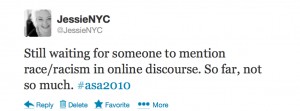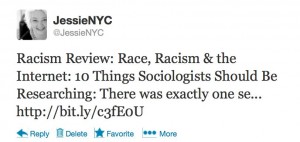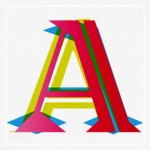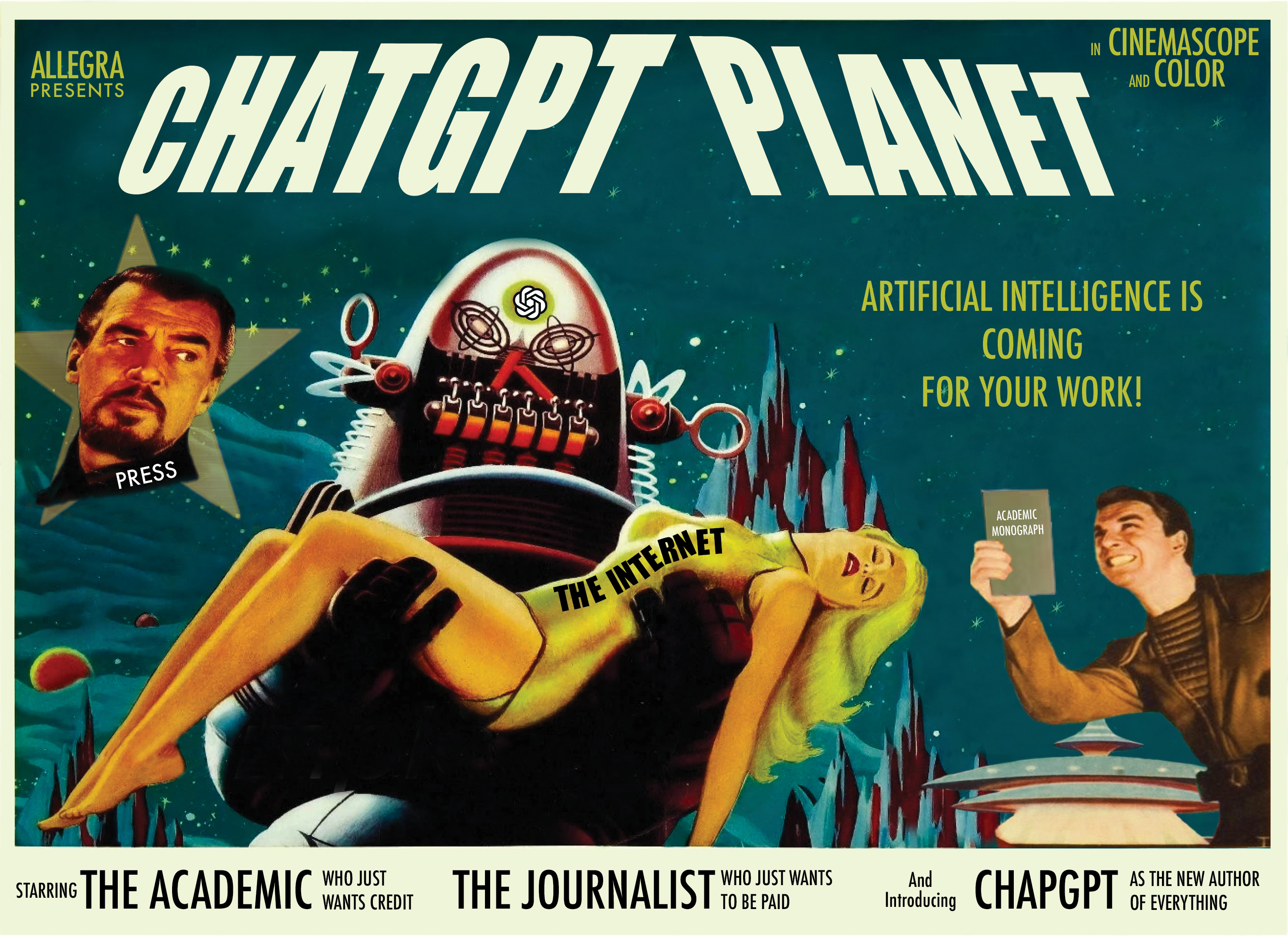We had been seeing much excitement in the social media around the post authored by Jessie Daniels titled ‘From Tweet to Blog Post to Peer-Reviewed Article: How to be a Scholar Right Now’ – the text attached also below with the author’s kind permission. In the article – or more accurately, blog post – Daniels describes how the social media has altered how she currently writes academic texts; how most steps thereof bare little resemblance to what we are used to thinking that academic writing entails. The primary outcome could be described as writing process ‘turned inside out’: all the phases that are customarily ‘private’ and occurring behind closed doors – the unfinished thought, the underdeveloped theoretical conceptualisation etc – are made publicly available and thus also subject to comments and collective Brainstorming.
Since one of Allegra’s self-imposed mandates is to find creative ways to ‘FILL DEAD SPACE’, we want to salute Daniels’ insightful discussion. Indeed, the tools available via the social media may not only impact how scholarly work is disseminated via open Access – to fully embrace its possibilities can amount to much more. This is also how we see Allegra’s role as a genuine laboratory where also unfinished thoughts are fleshed out, to be thus subjected to comments, revision, eventually perhaps becoming traditional academic articles – which are then again reworked via posts, comments etc.
Thus this is a conversation that Allegra will certainly continue participating in! Today we want to do so by revisiting some of our earlier findings of the current transformations of academic publishing via a post from November 2013 – a revisitation which simultaneously provides testament to the genuine ‘frenzy’ of the moment as much more has already happened in the past few short months with more open access experiments appearing each week. Stay tuned for more updates soon, but first:
OPEN ACCESS, BLOGGING, VIRTUAL ISSUES AND SPILLOVER – TRACING PUBLISHING ‘TRENDS’ REDUX!
Last week we had a discussion with Tim Ingold – a consistent source of inspiration for Allegra – on the future of publishing in anthropology and beyond. This week we wanted to follow-up by sharing what we have learned on the ongoing changes of scholarly publishing through our ‘Allegra experience’ so far. Perhaps due to a vague collective hesitance in the face of the new media, anthros have been a tad slow in getting started when compared to other fields. However, now hesitance seems to be firmly left behind as a ton is happening – to the extent, in fact, that new initiatives launched only an academic moment ago seem to have been with us forever!
Just take HAU: Journal of Ethnographic Theory: it is only in VOLUME 3, yet it has already established itself as one of the leading journals in our field – a sure sign of a scholarly field ready for new openings (not that the cutting-edge content of HAU is hurting either). That the future lies in open access is perhaps confirmed by the first issue – published in October 2013 – of Open Access: a Public Journal of the American Anthropological Association. Open access journals and those published solely online are also sweeping legal anthropology with the Anthropologies in Translation: Journal of Legal Anthropology leading the pack. The journal is likewise in its third volume, the first having been published in 2008.
Yet, as Ingold rightfully pointed out,
“On the face of it, open access looks like an admirable principle to which we would all want to subscribe. But the appearance is misleading, and the current call for open access is in fact playing directly into the hands of government, large corporations and predatory publishing houses, all of which must be taking much delight in our academic gullibility. For anthropology, to endorse open access unequivocally would be an own goal. Here’s why. Whatever regime is in place, specialist academic publishing is an extremely costly business. The question is whether these costs are borne up front by the producers of research, or by its consumers (readers and subscribers). Open access would shift the burden from the latter to the former”
These concerns do appear to hold merit when compared to the fees charged, for example, by Sage for publishing articles in its journals: $ 99, a relatively standard appearing, yet quite a startling figure. Sage does note that scholars lacking means can seek to have the fee waived, but somehow that seems not to remove the problem entirely. In addition to publishing fees, Open Access is currently awakening controversy in neighbouring fields. Most notable is the ongoing controversy among US historians and the fate of PhDs published online. Sadly, much of the controversy seems again enwrapped with money: will publishers be interested in picking up manuscripts the main gist of which has been made available for one and all as an online version of a phd – concerns that conflict sharply with the desires of the scholar in question to make her scholarship as widely available as possible. Others want to reassure us that concerns about open access are largely ‘mythical’, and should be put to rest. Yet, it appears undisputed that open access journal’s do form a ‘market’, perhaps increasingly also governing the ‘market’ of academic publishing more generally.
Overall, it appears that we may have just seen the ‘tip of the iceberg’ in regards to changing formats and approaches. And indeed, as Ingold notes and as Susan Coutin, president of APLA, also pointed out in an earlier discussion with Allegra the ongoing discussions are not merely of creating venues for making ‘traditional’ scholarly contributions more widely accessible, but also offering ways to expand the reach of anthropological discussions more generally. In legal anthropology, experiments include the POLAR: Political And Anthropological Review ’Spillover’ which “exceed the printed page”, a purpose also at the centre of POLAR’s virtual issues. More deeply routed discussions to re-think anthropologists’ engagement with the surrounding world will continue via the APLA call to rethink the future of publishing for Political and Legal Anthropology, which will continue in the APLA business meeting at this year’s AAA – and Allegra will naturally follow up. Of course here blogs have already taken a head-start with the future, being restricted in their formats only by the limitations of their moderators’ creativity. In anthropology, particularly active have become Savage Minds and Living Anthropologically, the latter of which offers also a list of anthropology blogs – and by their numbers, things are looking bright.
Like Allegra, many of them are also active in Facebook, which seems to be transforming into an increasingly fruitful platform – not for just distributing pictures of cats, but also – for serious scholarly debates. We have found Facebook to offer numerous ways of making people aware of our efforts, and judged by the look of things, most people also seem to find their way to Allegra via Facebook (more on this another time!). The ‘big’ players are also following cue, with the European Association of Social Anthropologists recently announcing that its social media presence is getting stronger, with a considerable increase in the number of people following EASA on Facebook and Twitter; and also APLA is devoted to making both its website and Facebook site more active. With all these changes ongoing – and also the widely spread positive feedback that we are getting for Allegra – it feels undisputed that a ‘change is in the air’ and that there is a collective readiness for new openings challenging the conventions of form and content.
Allegra is pleased to be riding this wave, and thanks one and all for joining us thus far. We’ll continue the ride to the unknown with excitement and curiosity!
From Tweet to Blog Post to Peer-Reviewed Article: How to be a Scholar Now

Digital media is changing how I do my work as a scholar. How I work today bears little resemblance to the way I was trained as a scholar, but has everything to do with being fluid with both scholarship and digital technologies. To illustrate what I mean by this, I describe the process behind a recent article of mine that started with a Tweet at an academic conference, then became a blog post, then a series of blog posts, and was eventually an article in a peer-reviewed journal.
My article, Race and racism in Internet Studies: A review and critique (New Media & Society 15 (5): 695-719), was just published in the August, special issue of New Media & Society on The Rise of Internet Studies, edited by Charles Ess and William Dutton. The germ of an idea for the paper began at the American Sociology Association Annual Meeting in 2010. I attended sessions about online discourse and, given my interest in racism in online discourse, I kept expecting some one to bring up this issue.
I was disappointed by the lack of attention to racism, or race more generally, in the sessions I attended, and Tweeted that observation, using the hashtag of the conference (#asa2010). When I consulted the program for the conference I was truly perplexed to find that the only session on race and digital media was the one I’d help organize. In a lot of ways, a Tweet is just a “soundbite” in 140-characters of text. And, as the astrophysicist Neil deGrasse Tyson suggests, there’s nothing wrong with a soundbite, especially if you want to reach a wider audience than just other specialists in your field.
That one Tweet – and the lack of scholarship it spoke to – got me thinking about the kinds of sessions I would like to see at the ASA and the sorts of things I thought sociologists should be studying in this area, so I wrote a blog post about it, “Race, Racism & the Internet: 10 Things Sociologists Should be Studying.” As I usually do now, I shared that blog post via Twitter.
I got many responses from people who shared their work, and the work of their students, friends and colleagues, with me in the form of comments to the blog or @replies on Twitter. The suggestions for further citations came from people I know almost exclusively through our interactions via the blog or Twitter. That feedback from geographically-remote, institutionally-varied yet digitally-close colleagues got me thinking about expanding that single blog post into a series of posts. I wanted to review the wide-range of interdisciplinary work happening in what Ess and Dutton call “Internet studies.” Why bother with this, one might reasonably ask?
Central to this new workflow of scholarship is the blog, Racism Review (RR), which I started in 2007 with Joe Feagin, a past president of the ASA, with the goal of creating an online resource for reliable, scholarly information for journalists, students and members of the general public who are seeking solid evidence-based research and analysis of “race” and racism. The blog has very much become part of “how to be a scholar” in the current, digital moment. I use it to post first drafts of ideas, to keep up-to-date on the research literature, and since I firmly believe that writing is thinking, I often use it to work out just what I think about something.
The blog has also become a way to support other scholars both in their research and in teaching. A number of academics have told us that they use the blog in teaching; one, Kimberley Ducey (Asst. Prof., University of Winnipeg) uses RR blog posts in an instructor’s manual for a traditional intro sociology textbook as lecture suggestions, in-class activities, and essays/assignments. Through the many guest bloggers we host, I learn about other people’s scholarly work that I might not otherwise know about. And, the blog has become a mentoring platform, where early career scholars often get started with blogging and then go on to create their own. The blog is also content-hungry, so I’m always thinking about scholarship that might make an interesting blog post. So, back to the series of posts.
From late February to early March, 2011, I did a series of blog posts that expanded on the initial “10 Things,” post from August, 2010. Those posts were all about the current scholarship on race, racism and the Internet with each one focusing on a different sub-field in sociology, including: 1) Internet infrastructure and labor force issues; 2) digital divides and mobile technology; 3) racist social movement groups; 4) social networking sites; 5) dating; 6) housing; and 7) the comments sections of news and sports sites. This last area, racism in comments sections, prompted a research collaboration with one of the presenters from that 2010 ASA session I organized. The paper from that project eventually appeared in the journal Media, Culture & Society.
At about the same, there was a fortuitous Call for Papers for the Ess & Dutton special issue on Internet studies at 15 years into the field. So I combined all of the blog posts into one paper, and thought more about what my critique of the field as a whole might be. For that critique, I ended up revisiting some of Stuart Hall’s earlier writing about the “spectacle” of race in media scholarship and incorporated that with elements of Joe Feagin and Sean Elias’ critique of “racial formation” as a weak theoretical frame for Internet studies. The paper went into an extended peer review process, I revised it once, and it finally appeared (online ahead of print) in December 2012, and in print in August, 2013.
Except for the very end of this process – submitting the paper to the journal for peer-review – none of this way of working bares the least bit of resemblance to how I was trained to be a scholar. My primary job as an academic is to create new knowledge, traditionally measured by the number of articles and books I produce. Traditional graduate school training has taught us to think of a “pipeline” of notes, posters, conference papers, journal submissions (and/or, book proposals), revisions, resubmissions and finally, print publication. For me, how to be a scholar now is completely different than when I went to graduate school because of the way that digital media infuses pretty much every step.
This process I’ve described here – from Tweet at an academic conference, to a blog post, to a series of blog posts to a paper that became an article – is just one of many possible iterations of how to be a scholar now using digital media. Other permutations of how to be a scholar now might include live Tweeting an article you’re reading. Sometimes, when I get pre-set “alerts” in my email about newly published scholarship I’m interested in, I will share a title and a link via Twitter. If, upon reading further, I find the piece especially perspicacious, I may share select sentences via Twitter. If it happens that there’s a current event in the news that the article can help illuminate, then I’ll draft a blog post that incorporates it.
My experience with the germ of an idea shared as a Tweet at an academic conference that became a blog post, then a series of blog posts, and (eventually) a peer-reviewed article is just one example of the changing nature of scholarship. From where I sit, being a scholar now involves creating knowledge in ways that are more open, more fluid, and more easily read by wider audiences.
This piece appeared originally both at the LSE’s Blog ‘Impact of Social Sciences’ and the JustPublics@365 blog.
Note: This article gives the views of the author, and not the position of the Impact of Social Science blog, nor of the London School of Economics. Please review our Comments Policy if you have any concerns on posting a comment below.
About the Author
Jessie Daniels, PhD, is a professor at the City University of New York (CUNY) and is the director of JustPublics@365, a project designed to reimagine scholarly communication for the public good.







